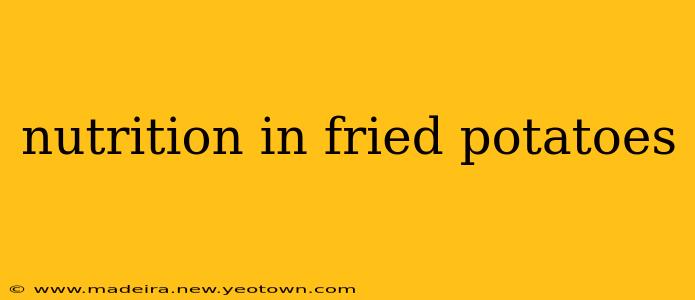Let's be honest, fried potatoes are a guilty pleasure for many. That irresistible crunch, the savory aroma… it's hard to resist. But beyond the deliciousness, what's really in those golden delights? This isn't about demonizing fried potatoes, but about understanding their nutritional profile, so you can enjoy them mindfully. We'll explore the nutritional landscape of fried potatoes, addressing some common questions and misconceptions along the way.
What are the nutritional benefits of fried potatoes?
This is where things get tricky. While potatoes themselves boast some nutritional value – containing vitamin C, potassium, and some fiber – the frying process significantly alters this picture. The deep-frying process often involves submerging potato slices in hot oil, which dramatically increases their fat content, primarily unhealthy saturated and trans fats. These fats contribute to elevated cholesterol levels and an increased risk of heart disease. The frying process also reduces the potato's vitamin and mineral content, stripping away much of the initial nutritional value. So, while the raw potato offers some benefits, the fried version significantly diminishes them.
Are fried potatoes healthy?
The short answer is: no, fried potatoes aren't considered healthy. The high fat content, often combined with added salt, makes them a calorie-dense food low in essential nutrients. Regular consumption of fried potatoes is linked to weight gain, increased risk of heart disease, and type 2 diabetes. However, this doesn't mean you can never enjoy them. Moderation is key. Occasional indulgence won't derail your health, but making them a regular part of your diet is definitely not recommended.
How many calories are in fried potatoes?
The calorie count in fried potatoes varies wildly depending on the size of the serving, the type of potato used, the type of oil, and the cooking method. A small serving might contain anywhere from 100 to 200 calories, but a larger portion, especially from a restaurant, could easily exceed 500 calories. It's always best to check the nutritional information provided by the restaurant or food manufacturer if available.
What are the health risks associated with eating fried potatoes?
The primary health risks associated with eating fried potatoes are directly related to their high fat and calorie content and the potential presence of acrylamide. Acrylamide is a chemical compound that forms when starchy foods are cooked at high temperatures (like frying). While research is ongoing, some studies have linked high acrylamide intake to an increased cancer risk. The high sodium content also contributes to hypertension and other cardiovascular problems. It's important to note that these risks are associated with frequent, high consumption, not an occasional serving.
Are there any healthier ways to cook potatoes?
Absolutely! Baking, boiling, roasting, or steaming potatoes preserve much more of their nutritional value compared to frying. These methods significantly reduce the fat and calorie content while retaining vitamins and minerals. Seasoning your potatoes with herbs and spices instead of relying on excessive salt enhances flavor without adding extra sodium. Experiment with different cooking methods and seasonings to discover delicious and healthier ways to enjoy potatoes.
Can you lose weight eating fried potatoes?
It’s highly unlikely. The high calorie and fat content of fried potatoes makes weight loss challenging if they are a regular part of your diet. To lose weight, you need a calorie deficit, meaning you burn more calories than you consume. Fried potatoes significantly contribute to your daily calorie intake, working against your weight loss goals. Focusing on a balanced diet with plenty of fruits, vegetables, lean protein, and whole grains, combined with regular exercise, is a much more effective approach to weight loss.
In conclusion, while fried potatoes offer a tempting taste experience, they aren't a nutritional powerhouse. Understanding their nutritional profile and potential health risks empowers you to make informed choices about your diet. Moderation, balanced eating, and exploring healthier cooking methods are key to enjoying potatoes without compromising your well-being.

